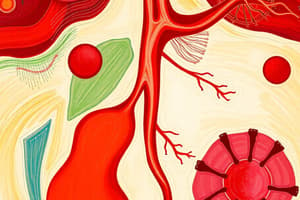Podcast
Questions and Answers
What is the biggest component of blood?
What is the biggest component of blood?
- Plasma (correct)
- Platelets
- Red blood cells
- White blood cells
Where are red blood cells primarily produced in the body?
Where are red blood cells primarily produced in the body?
- Liver
- Spleen
- Lungs
- Bone marrow (correct)
What causes the body to produce antibodies?
What causes the body to produce antibodies?
- Foreign antigens (correct)
- Increased red blood cell count
- Decreased plasma levels
- High hemoglobin levels
What is the medical term for the condition characterized by low levels of oxygen in the blood?
What is the medical term for the condition characterized by low levels of oxygen in the blood?
What disorder can occur when a rhesus positive male has a second child with a rhesus negative female?
What disorder can occur when a rhesus positive male has a second child with a rhesus negative female?
Which of the following terms describes the phenomenon where blood cells become aggregated into larger clumps?
Which of the following terms describes the phenomenon where blood cells become aggregated into larger clumps?
What is the primary origin of blood cell production in adults?
What is the primary origin of blood cell production in adults?
In the context of blood types, what is a common risk associated with erythroblastosis?
In the context of blood types, what is a common risk associated with erythroblastosis?
Which component of the immune response specifically targets and neutralizes foreign invaders like infectious cells?
Which component of the immune response specifically targets and neutralizes foreign invaders like infectious cells?
What condition is characterized by a deficiency in hemoglobin leading to reduced oxygen transport in the blood?
What condition is characterized by a deficiency in hemoglobin leading to reduced oxygen transport in the blood?
Flashcards are hidden until you start studying
Study Notes
Blood Composition
- Plasma makes up the largest proportion of blood.
- Red blood cells, white blood cells, and platelets are suspended in plasma.
Blood Cell Production
- Bone marrow is the site of blood cell production.
Immune Responses
- Antigens are markers found on the surface of infectious cells.
- Antibodies are proteins produced by the immune system to fight foreign cells.
Blood Disorders
- Anemia is a condition characterized by low oxygen levels in the blood, usually due to low hemoglobin levels.
- Agglutination is the clumping of blood cells, often triggered by incompatible blood types.
- Erythroblastosis fetalis is a disorder that occurs when a Rh-negative mother carries a Rh-positive fetus, particularly during a second pregnancy.
Blood Composition
- Plasma is the primary component of blood, comprising around 55% of its volume.
Hematopoiesis
- Bone marrow, a soft tissue found within bones, is the site of blood cell production.
Immune Response
- Antigens, unique identifiers located on the surface of cells, trigger an immune response when foreign cells enter the body.
- Antibodies, specialized proteins produced by the immune system, recognize and bind to antigens, marking foreign cells for destruction.
Blood Disorders
- Anemia is a condition characterized by low levels of hemoglobin, the protein in red blood cells responsible for oxygen transport. This deficiency leads to reduced oxygen delivery to the body's tissues.
- Agglutination, the clumping together of blood cells, can occur when incompatible blood types are mixed, leading to complications.
- Erythroblastosis fetalis, a serious condition affecting newborns, can occur when a Rh-negative mother carries a Rh-positive fetus. The mother's immune system may develop antibodies against the fetal blood cells, leading to hemolysis (destruction of red blood cells) in the fetus.
Studying That Suits You
Use AI to generate personalized quizzes and flashcards to suit your learning preferences.




